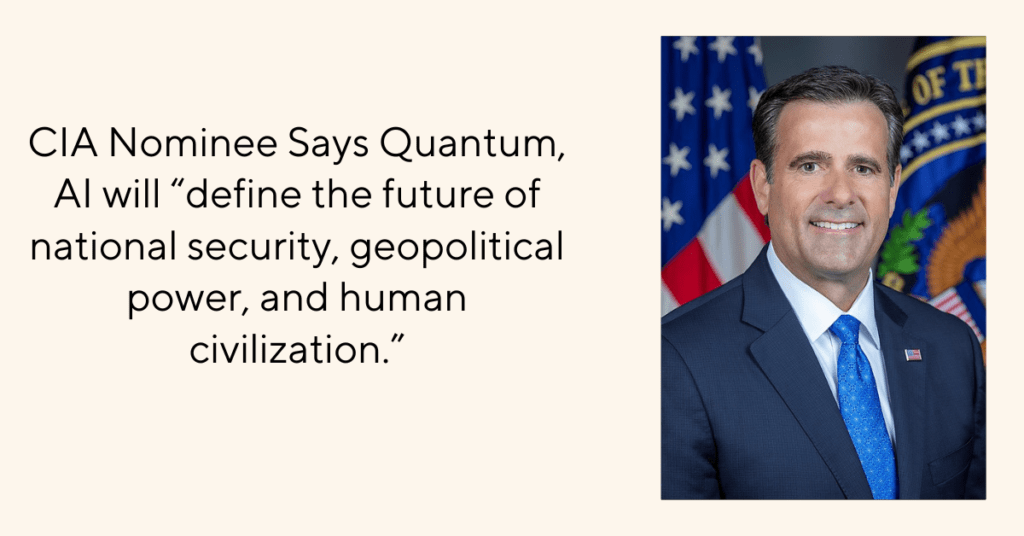Emerging Technologies: A New Frontier for National Security
During his recent confirmation hearing, CIA nominee John Ratcliffe shed light on the pivotal role of emerging technologies, such as quantum computing and artificial intelligence (AI), in shaping the future landscape of national security. Speaking before the Senate Intelligence Committee, Ratcliffe emphasized that these innovations are critical in countering the aggressive global ambitions of adversaries like China.
“These threats converge at a time of rapid technological change,” Ratcliffe stated. “Emerging technologies will not only define the future of national security but will also reshape geopolitical power and human civilization.” He addressed the unprecedented challenges that ubiquitous surveillance poses to one of the CIA’s core missions: collecting human intelligence.
China’s Technological Race
According to Ratcliffe, the rapid advancement in technology is shifting the global balance of power, with China firmly positioned as the United States’ primary adversary. Citing Beijing’s heavy investments in quantum technologies and AI, he explained that this is part of a broader strategy aimed at dominating various domains—economically, technologically, and militarily.
“Our adversaries understand that the nation that wins the race in emerging technologies will dominate the world of tomorrow,” he remarked, calling for an intensified focus on the threats posed by China and its ruling Communist Party. Ratcliffe’s urgency underscores the reality that the U.S. needs to adapt quickly to this emerging landscape.
Understanding Quantum Computing and AI
So, what exactly does Ratcliffe mean by quantum computing? This new frontier in tech uses the principles of quantum mechanics, allowing computers to process information at speeds that may soon outperform classical systems. Traditional computers rely on binary bits, but quantum computers utilize “qubits,” enabling them to solve complex problems that are beyond the capabilities of current systems. If adversaries develop these technologies first, U.S. cybersecurity and intelligence could be at significant risk.
Meanwhile, AI refers to computer systems that emulate human intelligence, analyzing massive datasets and identifying patterns for practical applications. Ratcliffe highlighted how AI is vital for surveillance, threat detection, and military operations, revealing the dual role of technology as both a tool for intelligence operations and a target that needs to be understood and monitored.
Modernizing the CIA
Ratcliffe is committed to modernizing the CIA to ensure it remains competitive in this fast-paced technological landscape. He pointed to the establishment of the CIA’s Transnational and Technology Mission Center and the introduction of a Chief Technology Officer position as steps in the right direction. However, he acknowledged the agency hasn’t always kept pace with the rapid advancements seen in the private sector.
Building a Merit-Based CIA
To tackle these challenges effectively, Ratcliffe emphasized the importance of talent acquisition and development. He envisions a meritocratic culture within the CIA, one that actively recruits skilled professionals from various fields. “The CIA must be a place that rewards meaningful contributions,” he noted, advocating for a robust system that holds team members accountable for their performance.
Heightened Focus on China
Describing China as the foremost challenge, Ratcliffe emphasized the need for the CIA to bolster its resources and sharpen its focus on counteracting Beijing’s technological advancements. He highlighted the newly created CIA’s China Mission Center as an essential initiative for addressing this escalating threat.
As he wrapped up his testimony, Ratcliffe reaffirmed his commitment to maintaining the U.S.’s intelligence capabilities while safeguarding civil liberties. “This is our once-in-a-generation challenge,” he concluded. “The intelligence is clear. Our response must be as well.”
As the landscape of national security evolves with the rise of emerging technologies, the implications are profound. The AI Buzz Hub team is excited to see where these breakthroughs take us. Want to stay in the loop on all things AI? Subscribe to our newsletter or share this article with your fellow enthusiasts.




